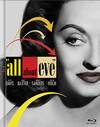





The Big Sleep (1946)
Cast | Crew | Articles | Bibliography | Downloads | Links | Image Credits
| Article 1 |
Woman Who Nixed the MimsyShe was taken for a tennis-playing poet, but in fact Leigh Brackett was the wit behind the hard-boiled screenplay for The Big Sleepby Vera RuleThe Guardian (London), August 3, 1995 page T10HOWARD HAWKS hired two guys to work over Raymond Chandler's The Big Sleep: Jules Furthman, in the business since silents, and the hard-rock novelist William Faulkner. Hawks decided to add a third, Leigh Brackett, author of a much-noticed 1944 private-eye novel, No Good For A Corpse, who had also scripted an amusing monster flick for Republic. Good dialogue was one of cinema's primary excitements: character, action and sex were all advanced within the exchange of words. Hawks thought Brackett wrote good dialogue. He phoned the agent, who sent Brackett round to Warner Bros. "In walked," said Hawks later, "a rather attractive girl who looked like she had just come from a tennis match. She looked as if she wrote poetry. But she wrote like a man." This may have been because, after seeing Bogart in John Huston's The Maltese Falcon, Brackett had crash-read Dashiell Hammett, John Steinbeck, Ernest Hemingway and Rudyard Kipling to crisp and compress her style. Or it could have been because she was an independent woman of 30, earning a living writing sci-fi for mags. Her family warned her "only nut-cases read it" and advised her to turn to Ladies' Home Journal for bigger bucks. But she did not much care for her family, as it was mostly women acting gracious or helpless in the hope a man would come by and provide. Whatever, Hawks hired her. She and Faulkner, of whom she was in awe, hammered the script through in under a week. Bogart complained to Brackett that some of it was too soft; but the mushier lines were Faulkner's; after which Bogart took mimsy scripts to her for doctoring. So did others - Hedda Hopper's encomium years later was headlined "They Call Her For Salty Dialogue". Yet the timing of her debut wasn't great. Dialogue was about to be superceded by spectacle, then by dumb action. And her egalitarian women - such as Lauren Bacall's educated, compromised heiress in The Big Sleep - were eclipsed. From then until now few female leads genuinely behaved equal. Brackett wasn't in studio demand, and anyway seems to have sensibly regarded Hollywood as an interlude in her pulp-writing day job. But Hawks kept up his connection. She wrote three Westerns for him, El Dorado, Rio Lobo and Rio Bravo; the throwing of a flowerpot by the heroine of the last - to save John Wayne's neck - is the best single self-determined female gesture of the 1950s. The industry did respect her for her professionalism, and for her connection with the great mid-forties. When Robert Altman coolly and logically updated Chandler's Marlowe (in The Long Goodbye, 1973), Brackett was his immediate choice as scenarist. She turned the work around speedily, as ever, and defended the director against all those who hated his anti-romantic diminishment of their hero. In 1978, at the age of 63, she was called in by Hollywood's newest big boy, George Lucas, whose Star Wars team had tried to imitate her urgent, combative tone. For its sequel, The Empire Strikes Back, Lucas wanted the real thing. Brackett gave in the first draft earlier than asked: two weeks later she died of cancer. Lucas handed on the project to an unknown youngster entranced by forties film noir, Lawrence Kasdan. He and Leigh shared the credits. Howard Hawks on Humphrey Bogart BOGEY was one of the best actors I worked with. He was a far cry from the actors of today, who are a little bit on the dilettante side . . . when I started working with him, I said, "Why don't you ever smile?" "Oh," he said, "I've got a bum lip." He had a lip that was badly cut up, and I think the nerves were cut. And I said, "Well, the other night when we got drunk you certainly were smiling and laughing a lot." He said, "Do you think I can?" And I said, "You'd better if you're gonna work with me . . ." I had trouble the first day with him. I remember grabbing him by the lapels and pushed his head up against the wall, and said, "Look, Bogey. I'll tell you how to get tough, but don't get tough with me." He said, "I won't." Everything was fine from that time on. He had had a couple of drinks at lunch, and that's what caused it. I stopped that. As for Lauren Bacall, she had to keep practising [sic] for months to keep that low voice. The funny thing is Bogey fell in love with the character she played, so she had to keep playing it for the rest of his life. © 1995 Guardian Newspapers Limited |
|
Article 1 | Article
2 | Article 3 |
| Now in Print! |
|---|
| Now on DVD! |
|---|
Buy Videos & DVDs |
|
Buy Movie Posters |
|
Buy Movie Posters |
|
Classic
Movie Merchandise |
|
![]() Printer-friendly version.
Printer-friendly version.
![]() Return
to the top.
Return
to the top.
Last updated:
March 10, 2011.
Reel Classics is a registered trademark of Reel Classics, L.L.C.
© 1997-2011 Reel Classics, L.L.C. All rights reserved. No
copyright is claimed on non-original or licensed material.
Terms of
Use.









